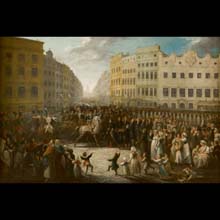
material: oil on canvas
dimensions: 108 x 180 cm
description: Prince Józef Poniatowski, who gained renown for his courage during the war between Poland and Russia in 1792, lost the society’s recognition as a result of the unsuccessful defence of Powązki during the Kościuszko Uprising and his riotous life after the Third Partition of Poland. He treated the nomination as the Minister of War in the Polish government, created by Napoleon, as an opportunity to struggle for the independence of the country, and he committed himself to the creation and development of the Polish army. When the war between Austria and Poland broke out in 1809, Poniatowski courageously defended the capital at the battle of Raszyn as the Commander in Chief of the Polish armed forces. Although the battle was not decisive, it boosted the morale of Polish soldiers and restored the commander’s good name. Prince Poniatowski started sabotage operations in Galicia. On Leading his soldiers, he entered Krakow on July 15. The city welcomed him enthusiastically. Town councillors, headed by Tomasz Krzyżanowski, gave Poniatowski the keys and took an oath of allegiance to Napoleon before him. As a result, Prince Józef Poniatowski began to gain renown as a national hero. Barbara Ciciora
exposition: The Gallery of 19th Century Polish Art in Sukiennice,
The Cloth Hall, 1, Main Market Square
key: Romanticism. Towards national art >>>
dimensions: 108 x 180 cm
description: Prince Józef Poniatowski, who gained renown for his courage during the war between Poland and Russia in 1792, lost the society’s recognition as a result of the unsuccessful defence of Powązki during the Kościuszko Uprising and his riotous life after the Third Partition of Poland. He treated the nomination as the Minister of War in the Polish government, created by Napoleon, as an opportunity to struggle for the independence of the country, and he committed himself to the creation and development of the Polish army. When the war between Austria and Poland broke out in 1809, Poniatowski courageously defended the capital at the battle of Raszyn as the Commander in Chief of the Polish armed forces. Although the battle was not decisive, it boosted the morale of Polish soldiers and restored the commander’s good name. Prince Poniatowski started sabotage operations in Galicia. On Leading his soldiers, he entered Krakow on July 15. The city welcomed him enthusiastically. Town councillors, headed by Tomasz Krzyżanowski, gave Poniatowski the keys and took an oath of allegiance to Napoleon before him. As a result, Prince Józef Poniatowski began to gain renown as a national hero. Barbara Ciciora
exposition: The Gallery of 19th Century Polish Art in Sukiennice,
The Cloth Hall, 1, Main Market Square
key: Romanticism. Towards national art >>>












